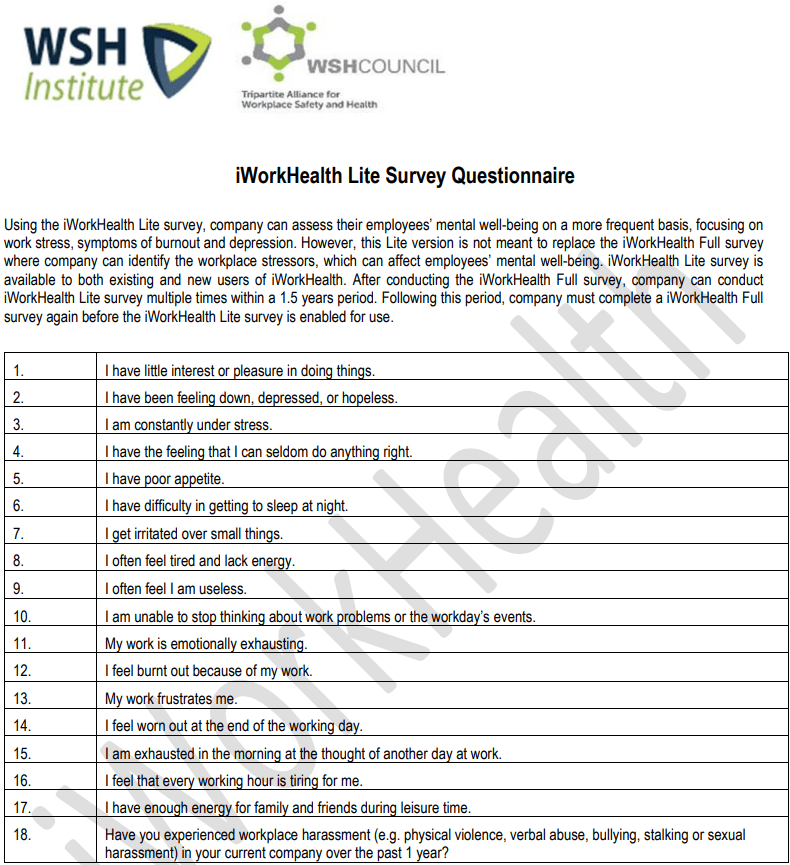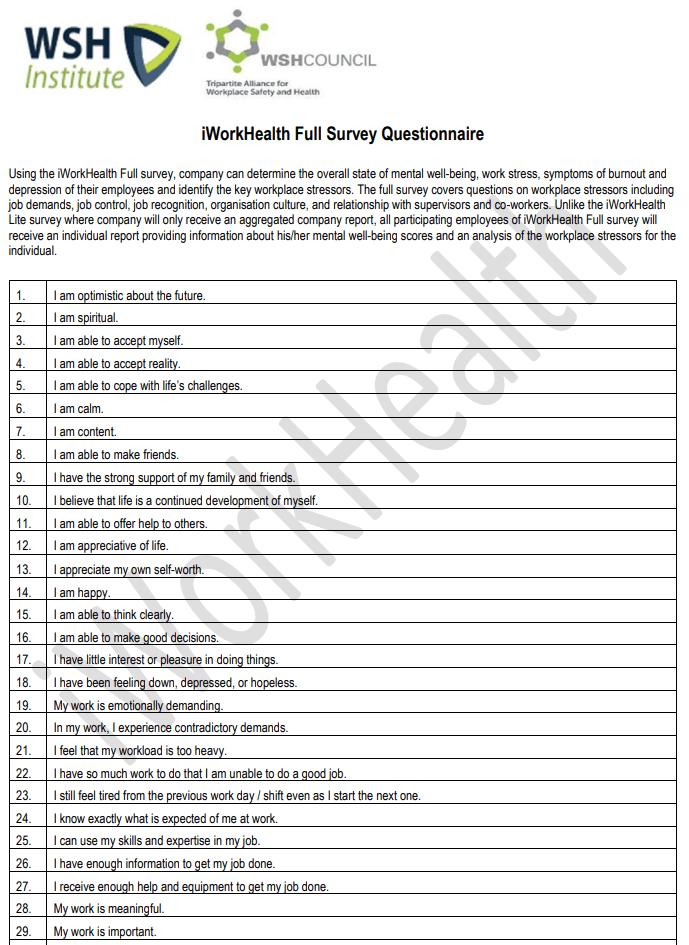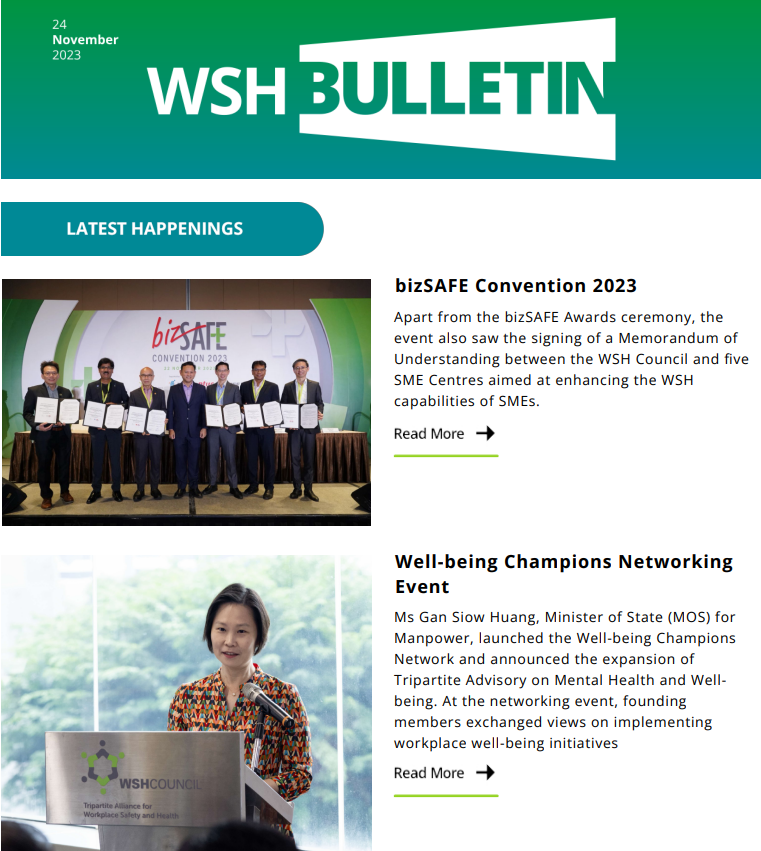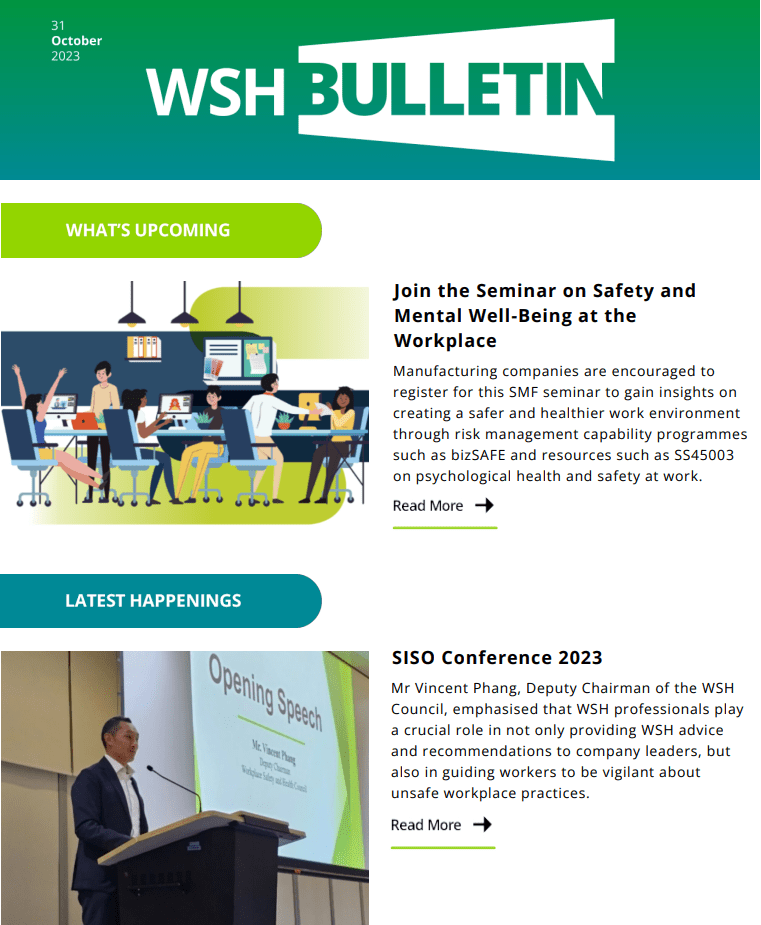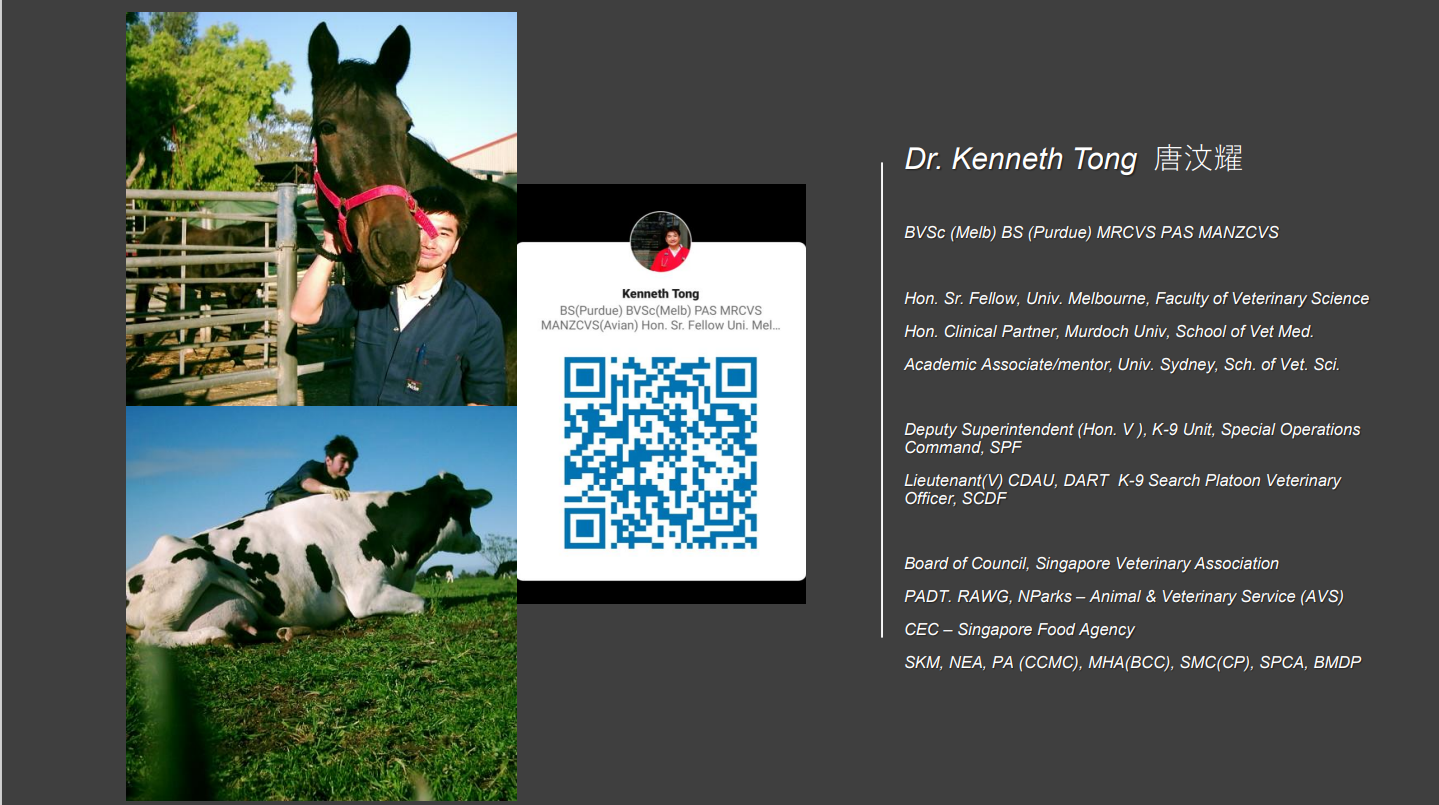The report will give you scores for each of the respective workplace stressors. Click on below to view the recommended interventions.
I am an employee
I am an employer
Juggling multiple roles and responsibilities is part of life and can be overwhelming at times.
Break down your worries by categorising them into the three circles of Control, Influence and Acceptance as per diagram below. Choose to focus your energy on things within your control and influence.

Adapted from
The Career Psychologist
Your anxieties may still persist even after breaking down your worries. Read on to find out what else you can do to relief stress.
General recommendations to manage stress and burnout:
•
Discover stress-busting powers which can help you manage your mental health from the
MindSG webpage.
•
Attend stress management talks and workshops.
•
Chat with
Wysa – a free AI chatbot within
Mindline to help you keep track of your state of mental health and learn more about how you can manage stresses.
•
Seek help from a mental health professional such as speaking to a counsellor, psychologist or psychiatrist, provided by your employer or private insurer. Sometimes, you may find it difficult to cope on our own despite trying to do so, and it is okay to seek help from others. It is okay not to be okay and to seek help if you are going through a difficult time. Asking for help is not a weakness.
•
Call the following helplines if you need to reach out:
o
Samaritans of Singapore: 1800 221 4444 (24 hours)
o
Singapore Association for Mental Health: 1800 283 7019
o
Care Corner: 1800 3535 800 (Mandarin)
o
Association of Women for Action & Research (for women in distress): 1800 777 5555
o
Institute of Mental Health Helpline: 6389 2222 (24 hours)
Recommendations to address specific workplace stressors
Find out what you can do to address the workplace stressors identified in your iWorkHealth report:
Workplace Harassment
Workplace harassment occurs when someone in the workplace harasses, alarms or distresses you with his or her behaviour.
Recommendations
Consider these tips to avoid harassment:
•
Report potential cases to your management or HR department immediately.
•
Keep your distance from anyone who exhibits unacceptable social behaviour. If this is not possible, stay alert and look for escape routes if needed.
•
Adopt a buddy system in situations where personal safety may be compromised.
•
Call for help using pre-arranged distress signals or a personal duress system (safety alarm) if your safety is compromised.
•
Be familiar with workplace harassment-related policy and procedures in your organisation.
If you face workplace harassment or know someone who is experiencing workplace harassment, you should:
•
Report the incident immediately to your supervisor, HR personnel or someone on the management team, so that they can intervene promptly.
•
Seek emotional support e.g. from peer support programme or Employee Assistance Programme.
•
File a
report with TAFEP, or call 6838 0969 for advice.
•
Make an
online police report for possible violations under the Protection from Harassment Act (POHA). Alternatively, you may visit a police station to make your police report.
•
Refer to
TAFEP’s webpage for more channels to seek help.
Job Satisfaction
Job satisfaction is a feeling of fulfilment that a person derives from his/her job.
Stress can be caused by ambiguity/uncertainty of task or role, conflict of role, lack of variety, fragmented or meaningless work as well as underutilisation of skills.
Recommendations
•
Set up regular meetings with your supervisor(s) to let them know about any stressors or difficulties you are facing and explore possible solutions. Be specific and detailed on describing the matter that is bothering you and on the changes that you would like to see so that your supervisor could assist you as much as possible.
•
Meet up with a career coach e.g. from
Employment and Employability Institute or
Workforce Singapore, to get advice on reigniting your motivation at work.
Job Recognition
Job recognition is about promotion, pay, recognition of work performance and job security.
Stress can be caused by perceived career stagnation; poor career prospects, pay or benefits; job insecurity; or perceived low social value to work.
Recommendations
• Discuss with your supervisor(s) or HR representative to understand the underlying reasons, what you would like to achieve and explore possible solutions. Possible solutions could range from switching to another job role/department, upgrading one’s skills through courses, undertaking special projects, to refreshing and realigning oneself with the organisational values and purpose of role.
• Check in with career coaches to get a sense of other career options.
Job Demands
Job demands refer to the physical, social, psychological or organisational aspects of the job that require sustained physical and/or psychological effort.
Stress can be caused by high workload, lack of control over work pace, time pressure to meet deadlines, irregular shift schedules and inflexible work schedules or long working hours.
Recommendations
• Inform your supervisor(s) on what you are experiencing and explore possible solutions with them. Possible solutions include prioritisation of work, extension of deadline, reallocation of workload, hiring of temporary staff, and early preemption of irregular work hours and overtime.
• Explore engaging the help of others, if appropriate. This includes delegating tasks if you are leading a team.
Job Control
Job control refers to aspects of the job that allow us to have control over our own work performance.
Stress can be caused by low participation in decision-making and lack of control over work.
Recommendations
• Discuss with your supervisor(s) that you would like to have some degree of autonomy and flexibility in your work. Specify and be detailed on what aspects of work (work process, priority, resources, work pace, sequencing of tasks, etc.) you would like to have autonomy and flexibility on. If lack of skills is an issue, discuss with your supervisor(s) on how you can upgrade or refresh your skills so you can better perform at work.
Social Support
Social support refers to the relationship with supervisors and co-workers that provide socio-emotional support in the workplace.
Stress can be caused by poor relationships with colleagues, interpersonal conflict, lack of social support, and conflicting demands of work and home.
Recommendations
•
Discuss with your supervisor(s) and/or colleagues whom you have good rapport on how you can establish a cohesive, cordial and respectful working relationship with everyone in the organisation. Being respectful, socially and culturally sensitive, initiating and reciprocating greetings and putting a smile are also some ways, although subtle, to express that you want to establish a good working relationship with them.
•
Talk to your supervisor(s), HR representative or someone whom you can trust and explore solutions, be it work-related or personal.
•
Attend
courses on how you can improve relationships at the workplace.
Organisational Culture
Organisational culture is a system of shared assumptions, values and beliefs which governs how people behave in the organisation.
Stress can be caused by poor communication, low levels of support for problem solving and personal development, lack of definition on organisational objectives, lack of autonomy and empowerment on decision making, and deep-seated unchanging and inescapable situations that keep repeating itself.
Recommendations
• Do not be afraid to voice out your concern to your supervisor(s) or HR representatives.
• Give constructive feedback for change.
• Encourage others who have the same concern to speak up too.
• Make it a point to understand your organisation's goals, aims and direction of the business.
• Step up and play a part in building an open and supportive culture within the organisation.
Management Support
Management support refers to the management’s commitment and involvement in the workplace, as seen in its organisational values, policies, practices and procedures.
Stress can be caused by poor communication, low levels of support, and lack of staff involvement.
Recommendations
• Understand the company’s policies and structures in place to support you.
• Be actively involved and supportive towards initiatives that your employer may have for you.
• Discuss with HR representatives how you would like your management to better support you.
Your employees are the foundation of your company, and it is important to take care of their mental well-being as much as their physical safety. Companies that prioritise the mental health of their employees can have longer retention; higher productivity and performance; and more motivated employees with better morale.
People want to work for a company that cares about their well-being, and you will be able to attract significant talent to your company. Employees working with the knowledge that they are well taken care of can lead to enhanced job satisfaction and morale. This motivation in turn can give rise to higher productivity and therefore revenue generation. In addition, employees are less likely to experience conflict or leave their jobs, further reducing turnover and recruitment costs to your business. In short, everyone benefits and focusing on the mental well-being of your employees is the right move for your business.
General recommendations to improve employee mental well-being
- Train supervisors/managers on how they can establish an environment that supports the mental well-being of their team at work.
- Develop a psychologically safe, trusting and open work culture with appropriate forms of communication channels to share updates, changes or to seek opinions, share ideas, suggestions or concerns.
- Implement a free Community Employee Assistance Programme (EAP) platform offered by the Well-being Champions Network for all your employees in your organisation.
- Offer employees access to health and mental well-being programmes at the workplace. Funded programmes are available through WSH Council's Total WSH Programme or HPB's Workplace Outreach Wellness Package.
Recommendations to address specific workplace stressors
Find out what you can do to address the workplace stressors identified in your organisation’s iWorkHealth report:
Workplace Harassment
Workplace harassment occurs when someone in the workplace harasses, alarms or distresses another person with his or her behaviour.
Recommendations
•
Establish company policies that prohibit discrimination and any forms of harassment at the workplace.
•
Engage and communicate to staff on the availability of unbiased third-party assistance and national hotlines from Samaritans of Singapore, Institute of Mental Health, etc.
•
Set up a confidential whistle-blowing system and communicate this to your employees. Assure your employees that authorities handling the report will be impartial.
•
Ask your employees for feedback on what would constitutes harassment to them. Communicate the company’s policies towards behaviour that staff perceive as harassment.
•
Conduct an investigation, and if warranted, take actions against the perpetrator so that complainants are reassured of the company’s stance against harassment.
•
Provide necessary support to victims. If necessary, refer them to professional help.
For more information, please visit the following resources from TAFEP:
•
On how to manage and prevent
workplace harassment.
•
On setting up
grievance handling processes.
Job Satisfaction
Job satisfaction is a feeling of fulfilment that a person derives from his/her job.
Stress can be caused by ambiguity/uncertainty of task or role, conflict of role, lack of variety, fragmented or meaningless work as well as underutilisation of skills.
Recommendations
For all organisations
• Assign clear roles and explain purpose of role in the business value chain.
• Define tasks and responsibilities, and set milestones and deliverables that are SMART (specific, measurable, attainable, relevant and time-bound) to avoid role or task ambiguity and role conflict.
• Regularly review tasks and responsibilities to ensure that they are engaging, challenging and meaningful for each individual employee.
• Review work tasks to match jobs to employees’ abilities (e.g. physical needs, knowledge and skills), experience and aspirations.
For larger organisations
• If worker has multiple supervisors i.e. under matrix reporting, all supervisors should coordinate and arrange a single meeting with your employee to ensure role clarity and address any issues that your employee may have.
• Set up opportunities for your employees to network through different means such as townhalls, project work, cross-collaboration between teams, team bonding sessions at the workplace or outside of work.
• Set up regular communication/updates of business changes that have impact on your employees’ jobs and KPIs, which in turn encourage them to speak up and give you space and time to listen.
Job Recognition
Job recognition is about promotion, pay, recognition of work performance and job security.
Stress can be caused by perceived career stagnation; poor career prospects, pay or benefits; job insecurity; or perceived low social value to work.
Recommendations
For all organisations
• Schedule regular individual sessions with employees to work with them on achieving their career goal(s).
• Refresh and communicate to your employees on the required organisational values and importance of their roles/ tasks in the business value chain.
• Provide informal day-to-day recognition e.g. telling your employees when they have done a good job, providing small recognition awards from managers to employees.
For larger organisations
• Formulate a competency roadmap for each job role and provide adequate training to develop your employees’ competencies and skills.
• Establish and communicate to your employees a clear appraisal, compensation, rewards and benefits system (including salary range and bars.) for each job grade and title.
• Inform your employees of the outcomes, indicators or work goals that would be considered as good performance by your organisation.
• Establish career development roadmap (including values, competency and skills required) and improve communication to reduce uncertainty about career development.
• Establish policies and systems that encourage career mobility.
Job Demands
Job demands refer to the physical, social, psychological or organisational aspects of the job that require sustained physical and/or psychological effort.
Stress can be caused by high workload, lack of control over work pace, time pressure to meet deadlines, irregular shift schedules and inflexible work schedules or long working hours.
Recommendations
At supervisory level
•
Regularly assess the time required for tasks and set realistic deadlines.
•
Divide tasks into manageable subtasks or adjust processes to achieve a more balanced set of responsibilities within the team.
•
Adjust the workload and/or provide guidance on work prioritisation, such that it is in line with employees' capabilities and available resources.
At organisational level
1.
Work reduction
•
Identify tasks that can be reduced, e.g. eliminate unnecessary tasks or outsource specialised tasks to subject matter experts.
•
Identify activities/processes that can be automated or streamlined.
2.
Scheduling & job rotation
•
Rearrange shift schedules and breaks according to the workload e.g. avoid excessively long shifts and include rest periods in-between.
•
Reassign tasks to limit overexposure of employees to stressful situations over an extended period of time e.g. rotate roles/tasks after a certain time period.
•
Review manpower headcount requirements periodically and hire temporary staff, or provide support to assist the increase in workload, if budget allows.
3.
Work-life harmony practices
•
Pre-empt employees early on any ad-hoc irregular work hours, shifts and overtime so that employees can make necessary personal arrangements to allocate time for work.
•
Provide clarity on after-hours work communication. Refer to
Tripartite Advisory on Mental Well-being at Workplaces and
Sample policy on after-hours communication on how to do so.
•
Establish a work-life harmony policy, and implement and encourage take-up of
flexible work arrangements.
4.
Others
•
Provide adequate coaching and training on areas such as time management and supervisory practices (e.g. managing perceptions and expectations of staff, being able to plan, review and adjust workload levels accordingly).
•
Encourage employees to do stretching exercises that can be done at the workstation or during break times at meetings.
•
Refer to general recommendations mentioned above that help reduce stress across all aspects.
Job Control
Job control refers to aspects of the job that allow us to have control over our own work performance.
Stress can be caused by low participation in decision-making and lack of control over work.
Recommendations
• Provide opportunities for employees to have a say in how their work is carried out e.g. to participate in decisions and actions affecting their jobs (work process, priority, resources, work pace and sequencing of tasks).
• Provide opportunities for employees to develop skills to do their work e.g. through on-the- job training or external training.
• Conduct regular check-ins with employees on work processes and efficiency. Be open with feedback, align expectations and support employee success.
• Refer to general recommendations mentioned above that help reduce stress across all aspects.
Social Support
Social support refers to the relationship with supervisors and co-workers that provide socio-emotional support in the workplace.
Stress can be caused by poor relationships with colleagues, interpersonal conflict, lack of social support, and conflicting demands of work and home.
Recommendations
•
Check in and communicate regularly with employees on how they are coping (especially during periods of change or high work demands) and provide guidance to reprioritise or manage workload.
•
Build supportive and open relationships between supervisors and employees, and among employees e.g.
o
establish mentor or buddy systems; and
o
organise bonding activities to encourage cooperation and teamwork.
•
Send managers and supervisors for courses to develop people management skills.
•
Set up a
peer support group within employees.
•
Refer to general recommendations above to help reduce stress.
Organisational Culture
Organisational culture is a system of shared assumptions, values and beliefs which governs how people behave in the organisation.
Stress can be caused by poor communication, low levels of support for problem solving and personal development, lack of definition on organisational objectives, lack of autonomy and empowerment on decision making, and deep-seated unchanging and inescapable situations that keep repeating itself.
Recommendations
For all organisations
•
Leaders need to "walk the talk" to advocate mental well-being.
•
Develop a psychologically safe, trusting and open work culture with appropriate forms of communication channels to share updates, changes or to seek opinions, share ideas, suggestions or concerns. You can refer to the
Tripartite Advisory on Mental Well-being at Workplaces and
A Playbook on Workplace Mental Well-being on how to do so.
•
Review and regularly communicate to everyone the organisational values and behaviours with examples of 'Dos' and 'Don’ts'.
•
Be transparent in your decision-making process and provide timely updates to employees on important decisions. When your employees are aware of your plans, uncertainty, speculation and stress can be reduced.
•
Encourage
employee self-care.
For larger organisations
•
Build supervisory skills in people management, supervisory practices, communication, stress management, etc.
•
Engage the services of a consultant to develop fresh insights and approaches to address organisational issues.
•
Set up an anonymous feedback channel so that staff can be involved in shaping the organisational culture, values and behaviours.
Management Support
This refers to the management’s commitment and involvement in the workplace, as seen in organisational values, policies, practices and procedures.
Stress can be caused by poor communication, low levels of support, and lack of staff involvement.
Recommendations
Organisational policies and benefits
•
Review HR policies to ensure hiring practices, workplace practices and performance management systems are non-discriminatory and merit-based. Refer to
Tripartite Guidelines on Fair Employment Practices for more info on fair employment practices.
•
Establish return-to-work policies to support employees who are recovering from mental health conditions.
•
For companies with flexible employee benefits (e.g. medical benefits), consider extending the scope of coverage to include mental well-being programmes, mental health consultations and treatments.
Processes
•
Develop an action plan to address workplace stressors, with clear implementation milestones and targets. Involve your employees in identifying these measures to reduce workplace stress. This joint effort improves mutual understanding and facilitates subsequent planning and execution.
•
Provide strong and consistent support to demonstrate your commitment to reduce stress at work.
•
Using iWorkHealth, review the state of your employees’ mental well-being regularly to monitor effectiveness of preventive measures.
Promotion and communication
•
Educate and communicate risk and preventive measures to your employees e.g. as part of employee orientation or at regular platforms.
•
Establish regular and constant communication between management and employees to ensure transparency, trust and engagement amongst employees and leaders.
•
Encourage help-seeking and ensure that employees know where to get help e.g. helplines, peer support group and Employee Assistance Programme.
•
Raise employees’ awareness on mental well-being and mental health conditions through talks and workshops. Funded programmes are available through WSH Council's
Total WSH Programme or
HPB's Workplace Outreach Wellness Package.
Resources
Visit useful mental well-being resources.



